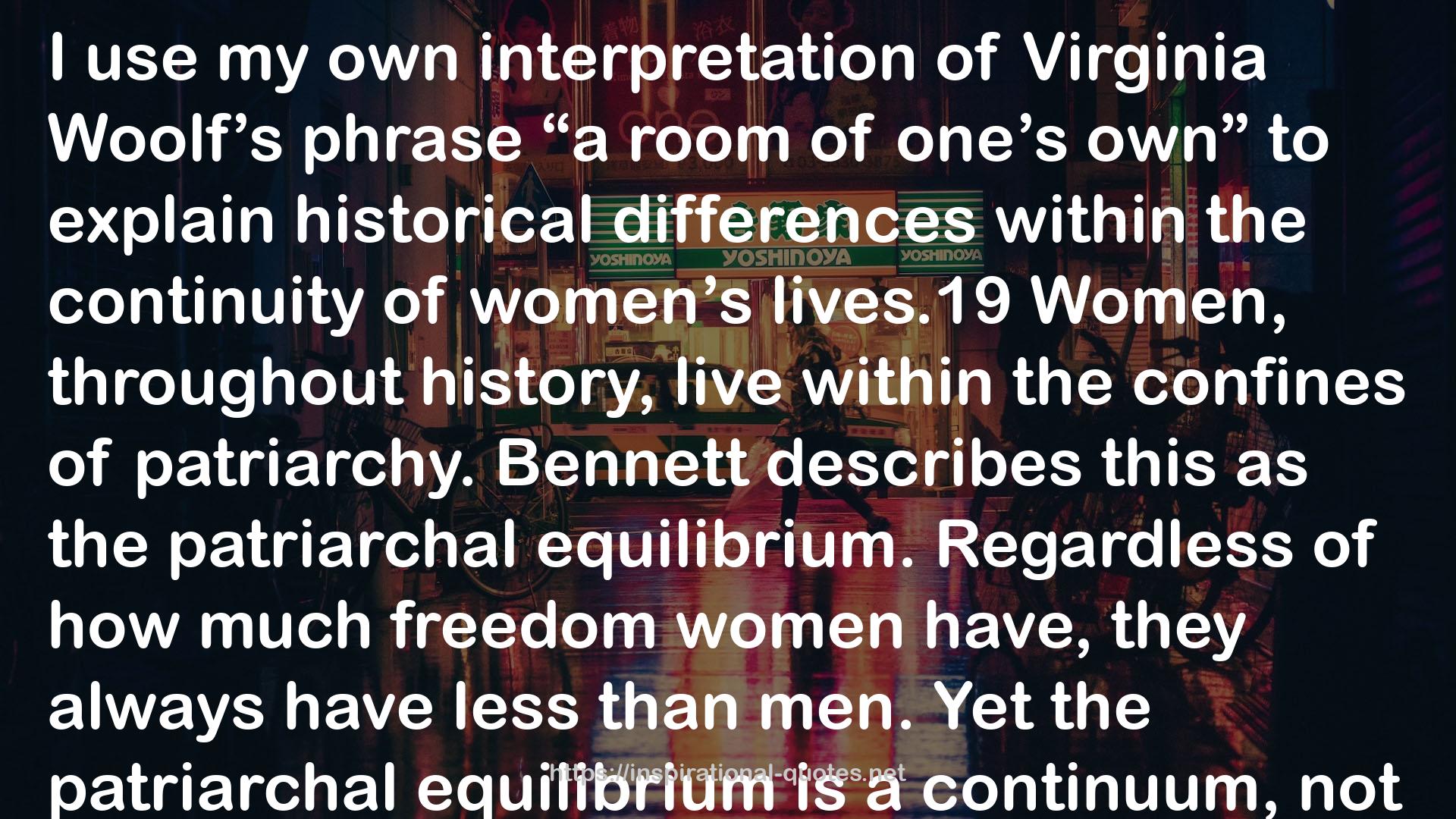21
" I use my own interpretation of Virginia Woolf’s phrase “a room of one’s own” to explain historical differences within the continuity of women’s lives.19 Women, throughout history, live within the confines of patriarchy. Bennett describes this as the patriarchal equilibrium. Regardless of how much freedom women have, they always have less than men. Yet the patriarchal equilibrium is a continuum, not a fixed standard. The boundaries of patriarchy wax and wane; the size of a woman’s room—the space where she is able to make her own choices—changes. Some women have bigger rooms, such as wealthy women with husbands and fathers among the highest social classes. Some women have smaller rooms, such as poorer women from families with little political and social influence. Historical circumstances, such as the aftermath of the Black Death in Europe, temporarily expanded women’s rooms by increasing their independence as wage earners, while other historical circumstances, such as Athenian democracy, made women’s rooms smaller. "
― Beth Allison Barr , The Making of Biblical Womanhood: How the Subjugation of Women Became Gospel Truth
33
" Paul was an educated Roman citizen. He would have been familiar with contemporary rhetorical practices that corrected faulty understanding by quoting the faulty understanding and then refuting it. Paul does this in 1 Corinthians 6 and 7 with his quotations “all things are lawful for me,” “food is meant for the stomach and the stomach for food,” and “it is well for a man not to touch a woman.”47 In these instances, Paul is quoting the faulty views of the Gentile world, such as “all things are lawful for me.” Paul then “strongly modifies” them.48 Paul would have been familiar with the contemporary views about women, including Livy’s, that women should be silent in public and gain information from their husbands at home. Isn’t it possible, as Peppiatt has argued, that Paul is doing the same thing in 1 Corinthians 11 and 14 that he does in 1 Corinthians 6 and 7?49 Refuting bad practices by quoting those bad practices and then correcting them? As Peppiatt writes, “The prohibitions placed on women in the letter to the Corinthians are examples of how the Corinthians were treating women, in line with their own cultural expectations and values, against Paul’s teachings.”50 What if Paul was so concerned that Christians in Corinth were imposing their own cultural restrictions on women that he called them on it? He quoted the bad practice, which Corinthian men were trying to drag from the Roman world into their Christian world, and then he countered it. The Revised Standard Version (RSV) lends support to the idea that this is what Paul was doing. Paul first lays out the cultural restrictions: “As in all the churches of the saints, the women should keep silence in the churches. For they are not permitted to speak, but should be subordinate, as even the law says. If there is anything they desire to know, let them ask their husbands at home. For it is shameful for a woman to speak in church” (1 Corinthians 14:33–35). And then Paul intervenes: “What! Did the word of God originate with you, or are you the only ones it has reached? If anyone thinks that he is a prophet, or spiritual, he should acknowledge that what I am writing to you is a command of the Lord. If anyone does not recognize this, he is not recognized. So, my brethren, earnestly desire to prophesy, and do not forbid speaking in tongues; but all things should be done decently and in order” (vv. 36–40). "
― Beth Allison Barr , The Making of Biblical Womanhood: How the Subjugation of Women Became Gospel Truth

